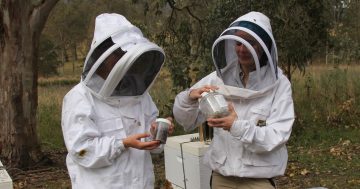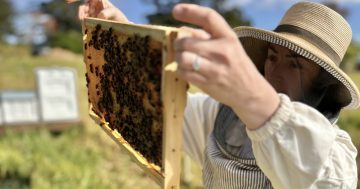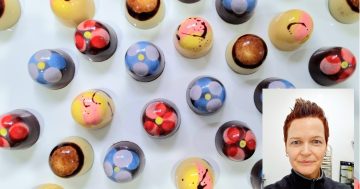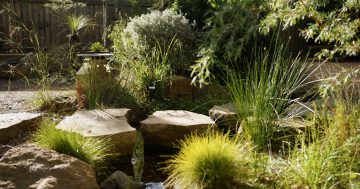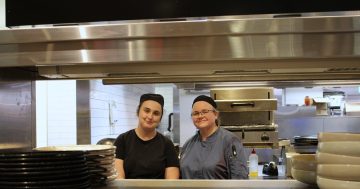
Bee Inspired founder Rachael Peedom is educating others on how to become beekeepers. Photo: Supplied.
Scared of bees after being stung as a child, Rachael Peedom never expected the winged insect would put the brakes on her aviation career.
The former pilot was living in Singapore, where almost all the fresh food was imported, nutritious whole foods were scarce and any bee was fumigated with dangerous chemicals.
However, it wasn’t until returning to Australia and settling in Kiama in 2016, after leaving the corporate world of luxury travel, that Rachael got the bug for bees.
She started studying nutrition science, which included classes about food security.
“It became obvious that it was great learning about food security, but the fundamental problem was we’re staring down the barrel of another America if we don’t do something about our pollination,” she said.
“You see what’s going on in other countries with too many pesticides, and the way they manage their crops with monoculture, and it’s just not sustainable.
“I live in an area where we’re surrounded by farmers and what’s becoming really obvious is that unless we start building sustainable practices into everything we do that’s producing crops and food, we’re going to run out of food.
“Pollination is a huge part of that.”
The food security lesson, coupled with a friend working for Flow Hive, propelled her interest.
Flow Hive, created in Byron Bay, allows beekeepers to harvest honey directly from the hive without disturbing the bees.
“So I got a hive and thought I’d just try it out,” Rachael said.
There were few female beekeepers, and many of the men involved in beekeeping were “anti-Flow Hive, old school and stuck in their ways”.
“I thought, well hang on a sec, maybe I can change this, so I started getting more hives as I learned more,” she said.
She now fluctuates between 15 and 25 hives in her backyard and at Saddleback Mountain, Foxground, Berry and Kiama’s Burnetts On Barney.
While Rachael admitted the best way to learn was to jump in, there were often many mistakes. To minimise this, she completed courses and sought the help of a mentor.
“There’s so much joy in it, but there’s also potential tragedy with bees dying, things going wrong and getting diseases,” she said.
Rachael identified a need for bee education, after seeing people spending $1200 on beehives and not getting results or having to destroy hives due to disease.
“Also I realised that if I wanted to have bees, I needed to be conscious of the fact that if there were lots of beekeepers who weren’t doing the right thing, we’re going to all end up with diseases spreading,” she said.
And so Bee Inspired took flight.

Bee Inspired runs educational workshops in preschools and primary schools. Photo: Supplied.
Rachael started with preschools and primary schools and worked with a Newcastle school principal on modifying the education curriculum to include beekeeping.
“Ideally, in the long term we would get bee education and pollination into every school as part of the curriculum, and it will happen over time,” she said.
“The joy on these kids’ faces when they are with the bees and open up the hive and they’ve got bees crawling all over them, it’s pretty amazing.
“I say to them, the bees as a colony are the most powerful organism on the planet.
“They’ve lived since the dinosaurs, and they’re still here, they’re highly resilient and resistant to anything we throw at them.”
One of the latest threats is varroa mite, a parasite eating the fatty part of bees from Newcastle to the Riverina and down to the Victorian border.
The mite was identified in June 2022 in biosecurity hives near Newcastle, but the hives were moved, spelling “game over” for eradicating it.
“It’s a really sad story, that one,” she said.
“It’s a bit like COVID lockdowns.
“If we had stayed put and not moved any hives and if the government would have supported the almond industry as a whole financially to get them through the season, they could have eradicated it.
“When I started beekeeping, there was a lot of concern about all these reportable diseases that now are pretty much insignificant in comparison to the threat of varroa mite.”
However, she was most concerned with the lethal and highly contagious American Foulbrood.
“You can easily spread the disease from hive to hive unless you manage and isolate your equipment between hives,” she said.
“I’m actually far more worried about that than I am with varroa mite because with that one you do have to burn the boxes and destroy the bees.”
Rachael encouraged those interested in beekeeping – whether the low-maintenance native bee or strong-pollinating honey bee – to first do a workshop to ensure their commitment, and then get a mentor to build confidence.
She said beekeeper goals range from producing honey, pollinating a garden or making candles.
“I just wish I would have learned about this when I was young because I remember just being scared of bees because I got stung on the foot once.”
Rachael aims to open an outlet to run workshops and bee-related events. For now, attend workshops at Kiama’s Burnetts on Barney.









